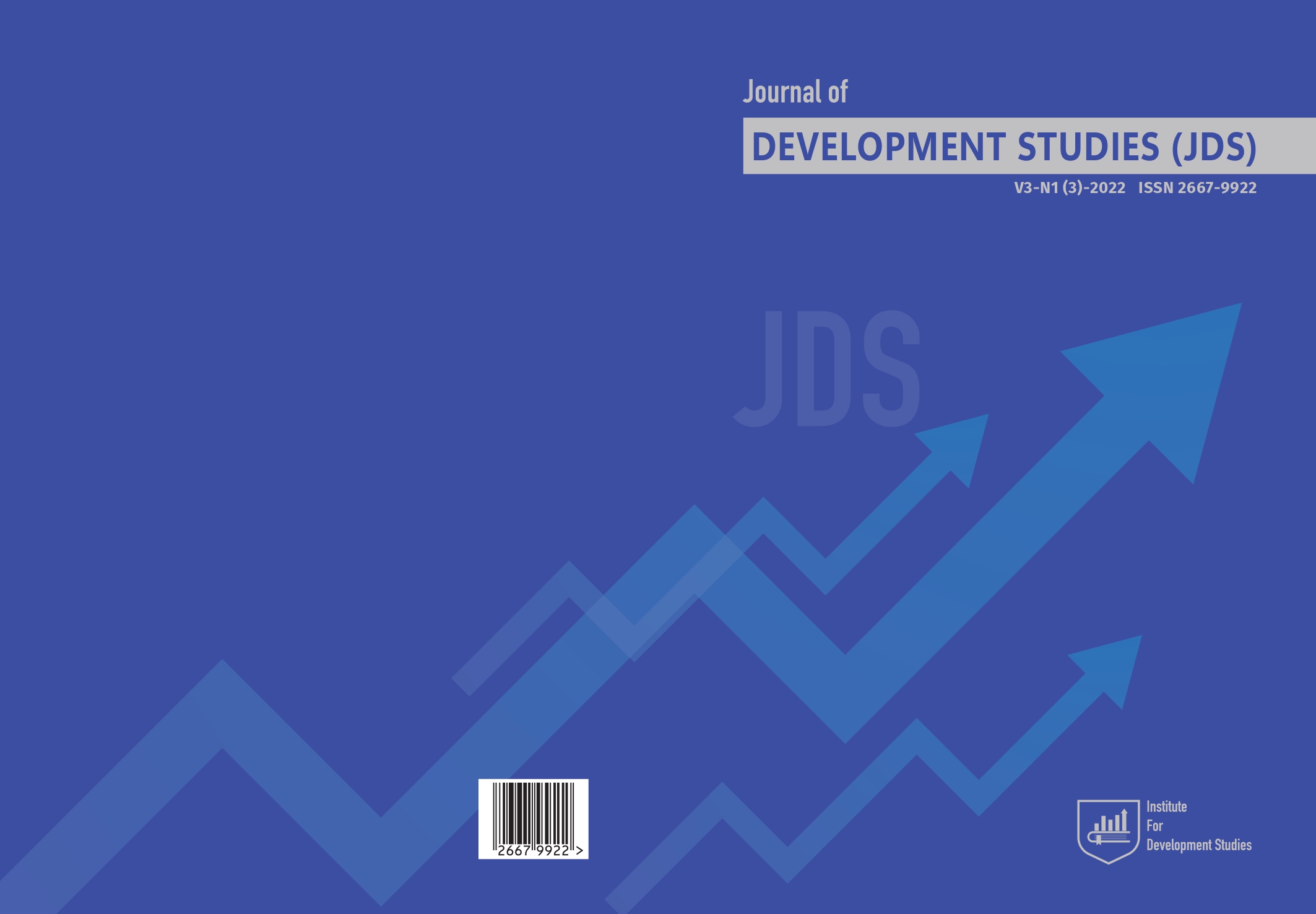Factors of Students’ Pro-Environmental Behaviour towards Sustainable Development
DOI:
https://doi.org/10.52340/jds.2022.03.03.01საკვანძო სიტყვები:
Pro-environmental Behavior, Environmental Consciousness, Green Lifestyle, Self-efficacy, Pakistanანოტაცია
This study aims to determine the impact of certain environmental factors on the pro-environmental behavior of students in Higher Education. A plethora of literature already exists on this subject; however, there is a significant gap in such research in the context of Pakistan’s Higher Education Institutions. Along with that, the combination of the variables chosen for the research had yet to be studied in detail, especially in the context of Educational Institutions in Pakistan. The study analyzed the impact of environmental consciousness, green lifestyle, and green self-efficacy on university students’ pro-environmental behaviour, with the mediating
role of environmental commitment. Data was collected using a standardized questionnaire on a 372-person sample of university students using convenience sampling via web interface. The sample of 372 students, from both private and public higher educational institutions, was chosen from whom to collect data, develop analysis, and draw results for our findings. Multiple statistical techniques were applied through SPSS Statistics 21 to analyze the data, and these included correlation analysis,
regression analysis, and exploratory factor analysis. The hypotheses were tested through the simple mediation model, using the Hayes Process. Our findings fill a gap in the research by demonstrating that individuals can indulge in green self-efficacy, a green lifestyle, and be environmentally conscious, which promotes their pro-environmental behaviour, when they are committed to the environment. The study provides useful insight for researchers and higher education practitioners/policy
წყაროები
Ardoin, N., Heimlich, J., Braus, J., & Merrick, C. (2013). Influencing Conservation Action: What research says about environmental literacy. Behaviour and Conservation Results. Natural Audubon Society.
Aziz, A. A., Najmi, A., Kanapathy, K. (2021). Exploring consumer participation in environment management: Findings from two‐staged structural equation modelling‐artificial neural network approach, Corporate Social Responsibility and Environmental Management, John Wiley & Sons, vol. 28(1), pp. 184-195, January.
Batool, Z., Qureshi, R. H. (2007). Quality assurance manual: For higher education in assurance, accreditation and the recognition of qualifications in higher education assurance. A selection of papers from the 3rd European Quality Assurance forum. Retrieved from http://www.oecd.org.els.stats.edu_db/def_uoe2.htm
Bittar, A. D. V. (2018). Selling remanufactured products: Does consumer environmental consciousness matter? Journal of Cleaner Production, 181, 527–536.
Bonnett, M. (2016). Environmental consciousness, sustainability, and the character of philosophy of education. Studies in philosophy and education.
Chen, C. L., Tsai, C. H. (2016). Marine environmen tal awareness among university students in Taiwan: a potential signal for the sustainability of the oceans, Environmental Education Research, 22 (7), pp. 958-977.
Chen, Y. S., Chang, C. H., & Lin, Y. H. (2014a). The Determinants of Green Radical and Incremental Innovation Performance: Green Shared Vision, Green Absorptive Capacity, and Green Organizational Ambidexterity. Sustainability, 6(11), 7787–7806.
Chen, Y. S., Chang, C. H., Yeh, S. L., & Cheng, H.-I. (2014b). Green shared vision and green creativity: the mediation roles of green mindfulness and green self-efficacy. Quality & Quantity, 49(3), 1169–1184.
Dakhan, S. A. (2020). Impact of Green HRM on Employees Pro-Environmental Behaviour: Mediating Role of Women Environmental Knowledge at Higher Education Institutions. IJCSNS Int. J.Comput. Sci. Netw. Secur, 20(12), 202-208.
Emas, R. (2015). The Concept of Sustainable Development: Definition and Defining Principles.
Festinger, L. (2012). Cognitive Dissonance | Britannica. In Encyclopædia Britannica.
Eren, B., Yaqub M. (2015). Environmental Consciousness Survey of University Students, Akademik Platform, / ISITES2015 Valencia -Spain.
Guo, L., Xu, Y., Liu, G., Wang T. (2019). Understanding Firm Performance on Green Sustainable Practices through Managers’ Ascribed Responsibility and Waste Management: Green Self-Efficacy as Moderator. Sustainability. 2019; 11(18):4976. https://doi.org/10.3390/su11184976
Handoyo, A., & Rufaidah, P. (2012). Green Lifestyle Dimensions: An Empirical Study.
Harvey, J. A., Thakur, M. P., Ellers, J. (2021). The Tarnished Silver Lining of Extreme Climatic Events. Trends in Ecology & Evolution.
Rizwan Anwar, Maha Jamil, Ansar Abbas, Shehzad Kamboh 18 IPCC (2021). Climate Change 2021: The Physical Science Basis. Contribution of Working Group I to the Sixth Assessment Report of the Intergovernmental Panel on Climate Change, WMO, UNEP, Intergovernmental Panel on Climate Change. https://www.ipcc.ch/report/ar6/wg1/downloads/report/IPCC_AR6_WGI_SummaryVolume.pdf
Iyer, P., Davari, A., & Paswan, A. (2016). Green products: Altruism, economics, price fairness and purchase intention. Social Business, 6(1), 39-64.
Jugert, P., Greenaway, K.H., Barth, M., Büchner, R., Eisentraut, S., & Fritsche, I. (2016). Collective efficacy increases pro-environmental intentions through increasing self-efficacy. Journal of Environmental Psychology, 48, 12-23.
Lang J.W, T. L. (2021). The science and practice of item response theory in organizations. Annual review of organizational psychology and organizational behaviour.
Lorenzen, J. A. (2012). Going Green: The process of lifestyle change. Sociological forum.
Mainieri, T., Barnett, E. G., Valdero, T. R., Unipan, J. B., & Oskamp, S. (1997). Green Buying:The Influence of Environmental Concern on Consumer Behaviour. The Journal of Social Psychology, 137(2), 189–204.
Mayer, F. S., & Frantz, C. M. (2004). The connectedness to nature scale: A measure of individuals’ feeling in community with nature. Journal of Environmental Psychology, 24(4), 503–515. https://doi.org/10.1016/j.jenvp.2004.10.001
Naureen, S., & Lodhi, F. A. (2015). Higher Education in Pakistan: Challenges and Prospects. Pakistan Perspective, 20(1).
Ozmen, H. (2006). Environmental consciousness and education relationship: Determination of how environment-based concepts are placed in Turkish science curricula January 2006 Asia-Pacific Forum on Science Learning.
Panno, A. (2018). Mindfulness, Pro-environmental Behaviour, and Belief in Climate Change: The Mediating Role of Social Dominance. Environment and Be haviour, 50(8), 864–888.
Schultz, N. (2007). The constructive destructive reconstructive power of social norms. Pshycology science.
Steg, L., Vlek, C. (2009). Encouraging pro-environmental behaviour: An integrative review and research agenda. Journal of Environmental Psychology, 29(3), 309–317.
Ramus, C., Kilmer, A. (2007). The impact of initiatives on low carbon behaviours. Scottish Government. Retrieved from www.eatwellscotland.org
Shafiei, A., Maleksaeidi. H. 2020. Pro-environmen tal behaviour of university students: Application of protection motivation theory. Glob Ecol
Conserv. DOI: 10.1016/j.gecco. 2020.e00908.
Tang, A. K. Y., Lai, K., & Cheng, T. C. E. (2016). A Multi-research-method approach to studying environmental sustainability in retail operations. International Journal of Production Economics, 171(P3), 394–404.
UNDESD (2014). Buckler C., Creech, H., Shaping the Future We Want, UN Decade of Education
for Sustainable Development (2005-2014), UNESCO https://sustainabledevelopment.un.
org/content/documents/1682Shaping%20the%20future%20we%20want.pdf
Yusliza, M. Y. (2020). Exploring the Interplay of Green Human Resource Management, Employ ee Green Behaviour, and Personal Moral Norms.
Yusliza, M. Y., Amirudin, A., Rahadi, R. A., Nik Sar ah Athirah, N. A., Ramayah, T., Muhammad, Z.,
Dal Mas, F., Massaro, M., Saputra, J., & Mokh lis, S. (2020). An Investigation of Pro-Environ mental Behaviour and Sustainable Develop ment in Malaysia. Sustainability, 12(17), 7083.
Zheng, Y. (2010). Association analysis on pro-en vironmental behaviours and environmental
consciousness in main cities of East Asia. Be haviourmetrika, 37(1), 55–69. https://doi.org/10.2333/bhmk.37.55
ჩამოტვირთვები
გამოქვეყნებული
როგორ უნდა ციტირება
გამოცემა
სექცია
ლიცენზია
საავტორო უფლებები (c) 2024 Rizwan Anwar, Maha Jamil, Ansar Abbas, Shehzad Kamboh

ეს ნამუშევარი ლიცენზირებულია Creative Commons Attribution-ShareAlike 4.0 საერთაშორისო ლიცენზიით .









